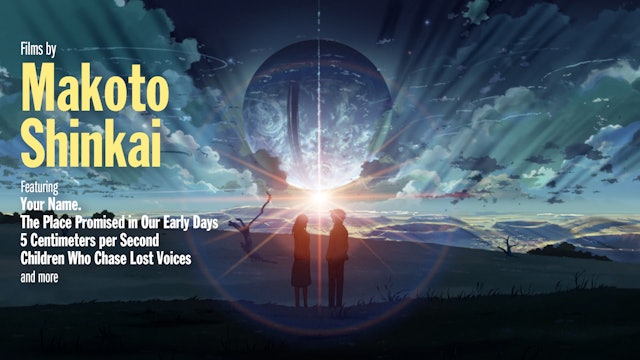Thoughts Transcending Time and Distance: Makoto Shinkai’s Voices of a Distant Star

Beginning with Your Name. in 2016 and continuing through subsequent hits Weathering with You (2019) and Suzume (2022), Makoto Shinkai has enjoyed a run of success unlike any other Japanese animation director since Hayao Miyazaki. His films have set box-office records at home, enjoyed huge returns internationally (particularly in China and South Korea), and earned widespread acclaim and passionate fandom all over the world. But it is not just his popularity that puts Shinkai in a lineage with Miyazaki: like the older artist, Shinkai possesses a singular voice; his films are the product of a readily identifiable auteur telling original stories in a time when franchises dominate not just anime, but commercial filmmaking around the world. That personal vision had already cohered in striking fashion in Shinkai’s 2002 short Voices of a Distant Star.
The moment that most clearly crystallizes this half-hour film and its place in Shinkai’s career comes at the climax, in which its protagonists share a monologue across a chasm of time and space. Noboru and Mikako, seemingly inseparable sweethearts as middle schoolers, are torn apart at the film’s outset, just before entering high school. Now, Noboru is a twenty-four-year-old man standing before a train crossing on a gray, snowy day; Mikako is still a fifteen-year-old girl, eight light-years away, piloting a mecha fighter through the atmosphere of the planet Agharta in the distant Sirius system, where she flies toward battle with the mysterious Tarsian alien invaders. But the thoughts of these quite literally star-crossed lovers are, in this moment, as one:
“You know, Noboru . . . I miss so many things. Because there’s nothing here. For example . . .”
“For example, summer clouds, the cold rain, the scent of an autumn breeze . . .”
“The sound of rain on the umbrella and the soft, spring soil . . . The peaceful feeling in a late-night convenience store . . .”
“And also the chilly air after school . . .”
“The smell of a blackboard eraser . . .”
“The distant sound of a truck at night . . .”
“The smell of asphalt in the afternoon rain . . . Noboru . . . I wanted to . . .”
“I wanted to share them with you forever, Mikako.”
Even as its narrative spans multiple solar systems and involves giant robots battling shape-shifting metallic space aliens, these simple sensory descriptions are the beating heart of Voices of a Distant Star. Whatever exposition we hear about the state of this mid-twenty-first-century world comes at us quickly, densely, and in fragments, juxtaposed against the richness of detail in Noboru and Mikako’s daily life. Amid a suite of modern Japanese urban spaces—high-rises, apartments, trains, classrooms—are interspersed beautiful illustrations of the sky and landscapes, often pockmarked by infrastructure, like an early shot gazing upwards at oncoming storm clouds through a dense network of power lines and communication cables.
Shinkai’s visual sensibility is already apparent; while the film’s character designs are extremely angular and rigid in their expressions, the backgrounds and the accumulation of lived-in detail within them—consistently the strongest points of Shinkai’s animation—are powerfully felt. The richness of color is breathtakingly varied and intense, particularly in a battle sequence in Agharta’s low orbit as the sun breaks over the curvature of the planet in spectacular shades of orange and red. Alongside Tenmon’s soft but emotive score, Voices of a Distant Star contrasts dense narrative exposition and fragmentary passages of daily life—which clubs the characters want to join, what class they think they’ll be in next year—with visuals that palpably embody the sensations of living in and experiencing this world; implicitly, we are told to focus more on these images than the words explaining what is happening and why. The exposition is, as it can often be in real life, just a distraction.







